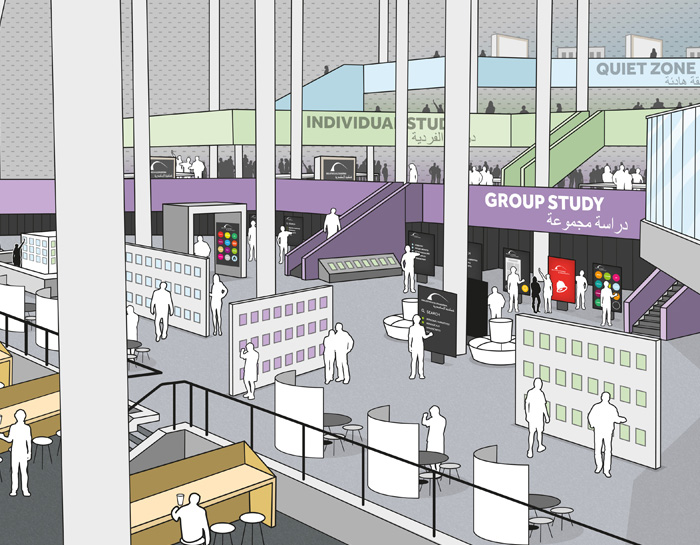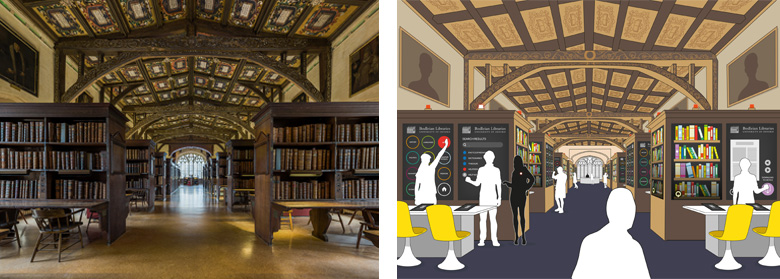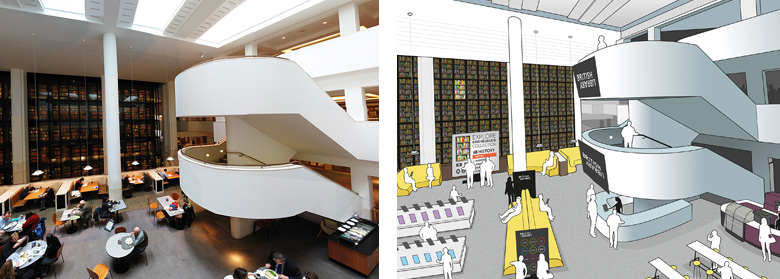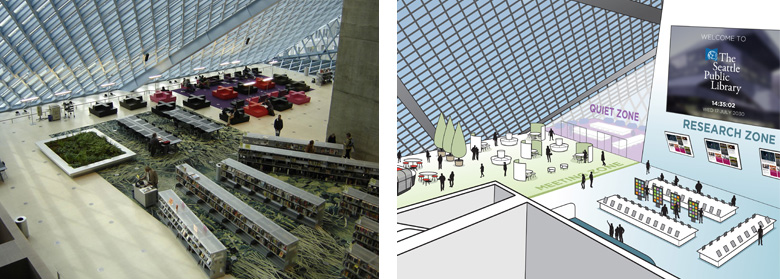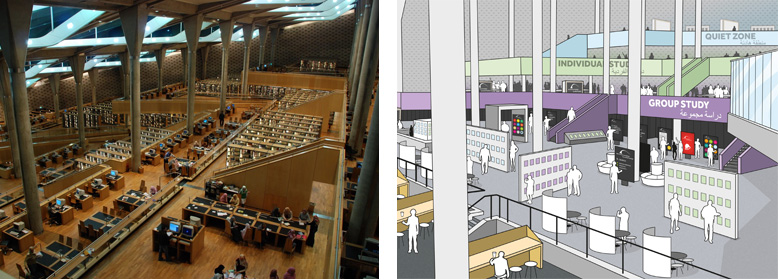World’s Most Iconic Libraries go Bookless for International School Library Month
Five of the world’s most iconic libraries have been transformed into digital spaces in a series of conceptual images released as part of International School Library Month.
The images, created by education interior design specialist, Innova Design Group, have been released alongside a prediction that bookless libraries could become common place in UK schools and universities within a generation.
Far from a far-fetched concept, the first bookless libraries already exist in America with the education sector leading the charge. Florida Polytechnic University’s library, which opened in 2014, doesn’t contain a single physical book. It instead offers access to more than 135,000 ebooks.
VIDEO: Bookless Libraries of the World
View on youtubeIn the series of images, Duke Humphrey’s reading room at Bodleian Library Oxford, The British Library, The US Library of Congress, Seattle Central Library and the Library of Alexandria in Egypt have all been given a digital makeover and made bookless.
According to Daniel Heginbotham, National Sales Manager, Innova Design Group, the pace of transition to digital means it is inevitable that bookless libraries are on their way to the UK and will first be seen in the education sector.
Daniel says: “The way young people and today’s students access information isn’t just starting to change, it’s not even mid change – it’s been changing for more than a decade.
“Anybody of GCSE age or below grew up not just with the internet – but with touchscreens and smart devices. This generation of students is online, tech and screen savvy and they read in a different way. A digital way. When you look at the kind of educational services they expect – traditional libraries dominated by, or even simply featuring print texts, must seem like something of a novelty – a relic from the past.
“If you pair the digital shift and modern dissemination of information with what we’re seeing across the Atlantic, all the evidence is pointing towards school, college and university libraries becoming high-tech knowledge centres where students can access digital works and collaborate on projects.
“To get the nation’s educators thinking ahead about this next big digital shift and considering the effect it will have on learning and resourcing at schools, colleges and universities, we decided to launch our Bookless Libraries of the World images during International School Library Month.”
In the series of concepts, Innova has transformed a mix of public, academic, historic and modern libraries. None are presently bookless.
Oxford University’s Bodleian Library
The libraries now incorporate technology such as state-of-the-art digital screens that masquerade as historic bookshelves while in standby mode and ‘scan to borrow’ functionality. Both ideas have been worked into the firm’s digital take on Duke Humphrey’s reading room at Oxford University’s Bodleian Library.
US Library of Congress
Perhaps the most famous of the remodelled libraries, the US Library of Congress, has seen its famous circular desk layout retained, but the traditional wooden worktops have been transformed into interactive screens.
The British Library
The British Library in London’s vaulted King’s Library collection of books assembled by King George III and bequeathed to the nation by King George IV, has however been left intact in its digital reinvention.
Daniel explains: “A condition of King George IV’s handover of the library in 1823 was that his father’s book collection should be on permanent public display – forever – which we found incredibly interesting.
“For new and existing libraries there is undoubtedly a place for print to exist alongside digital. We decided to keep the King’s Library in place to show that it is possible to build digital technology around a traditional collection in such a way that it enhances functionality.”
Seattle Public Library
The conceptual images also feature updates that focus on optimising the customer experience. Seattle Public Library and the Library of Alexandria in Egypt incorporate modern seating layouts and cafes so users can remain at the library in comfort for longer.
Library of Alexandria
“High street book shops, could also adapt to offer new services, such as cafés, that improve the user experience and entice students.
“In terms of bookless libraries becoming a reality here in the UK, this might be witnessed in the form of a phased shift from books to ebooks at existing facilities. However it is in brand new academic libraries that we may see the trailblazers as the education sector has a heightened need to align library offerings with the digital habits of younger learners.
Speaking about the changing face of libraries, Daniel concludes: “The UK public is already highly accustomed to all of the ingredients that make up bookless libraries. Providing all-digital facilities are introduced following detailed research and discussion, they will ultimately help to improve literacy while making books more accessible and reading more popular.
“By challenging perceptions and showcasing how some of the world’s foremost public and academic libraries would exist without books, we can kick-start the discussions needed to ensure that high-quality digital libraries become our future reality.”
Can bookless libraries sweep the UK within a generation? Let us know your thoughts! Join the conversation online @InnovaDesignLtd

